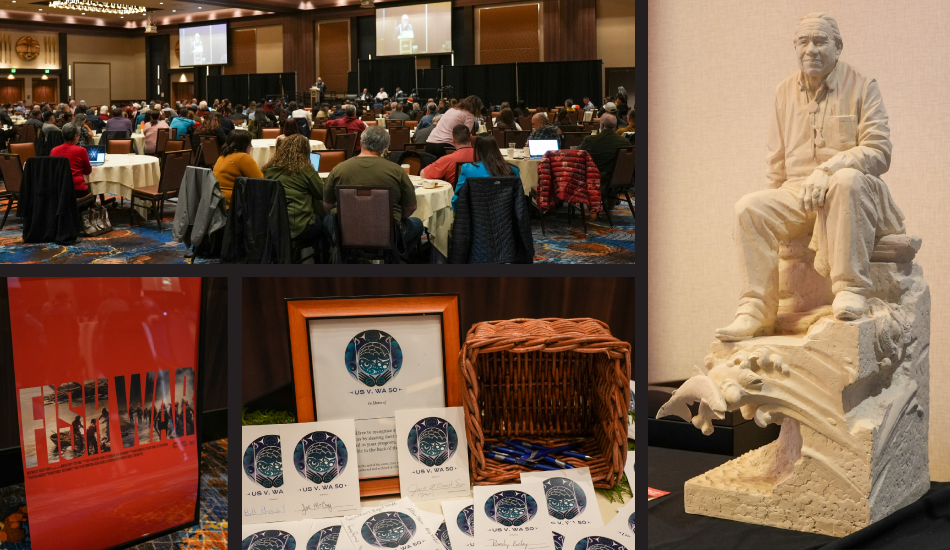By Hailey Palmer, Puyallup Tribal News
The Boldt Decision was recognized during the two-day U.S. v WA 50 event held Feb. 6 and 7 at the Muckleshoot Events Center in Auburn. The ruling that U.S. District Judge George Hugo Boldt handed down from United States v. Washington on Feb. 12, 1974 made history by reaffirming Tribal fishing rights dating back to the Medicine Creek Treaty of 1854.
Members of Puyallup Tribal Council were among an estimated 500-plus that attended the Muckleshoot event. Vice Chairwoman Sylvia Miller and councilmembers Annette Bryan, James Rideout, Monica Miller and Fred Dillon were present.
Panels each day covered a variety of Boldt-related topics including history, Fish War activism and ways treaty rights still at risk today.
Some speakers mentioned or thanked former Puyallup Tribal Council Chairwoman Ramona Bennett for her efforts during the Fish Wars. Bennett, with other Tribal members, defended Puyallup land and their rights to fish with “fish-ins.” These “fish-ins” became violent after they were raided, and attacked by game wardens and other state entities with many of the activists being beaten or arrested.
Nisqually Tribe Chairman Willie Frank III spoke on the teachings and impact his father, the renowned Native rights activist Billy Frank Jr., was able to pass on to him throughout his life.
“I think about my father, and he really could have been one of the most bitter human beings in the world, but he wasn’t,” Frank said of his father, who died in 2014. “He was the complete opposite. He was somebody who had to have a lot of patience in his life. He always told me the toughest thing about being an Indian is having patience.”
The design for a statue of Billy Frank Jr. that will be displayed at both the state Capitol and in the United States Capitol was recently unveiled. A miniature version of the statue was on display at the event in Auburn.
Colville Elder and former Colville Tribal Council member Mel Tonasket recalled when he first started running for Tribal Council in 1969.
He remembered hearing about the fights Nisqually, Puyallup and other Tribes were taking part in back then during the Fish Wars, and he wanted to find a way to help with his other Tribal Council members.
“(I said) odds are the state is going to run over their boats. Odds are someone is going to get beat up. Odds are some or all of them are going to get thrown in jail,” Tonasket said. “My whole council agreed to go. So, we brought 14 (people), and we lined up along the river waiting for something to happen.”
Makah Tribal member Bill Kalapa, invited up to speak by Frank III, used much of his time behind the microphone speaking about the impact Frank Jr. had and continues to have to this day for Natives.
“Billy Frank Jr. is a brilliant, brilliant light,” Kalapa said. “His gift was that he was a light we could all follow. When we all come together and when we all have the same light – that light can burn and shine as bright, if not brighter, than (Frank Jr.’s) light. His light is not gone, it’s in this room still. We’ve all got to pull together and we’ve all got to keep this fight going on behalf of the salmon.”
Some speakers emphasized that the fight still goes on today.
Despite the Boldt Decision being passed in 1974, many speakers emphasized that Tribes still face resource shortages and varying degrees of the same discrimination they faced on the water five decades ago.
“Your fight in the Lower Columbia really involves all of us and our fishing families,” Tonasket said. “I hope to God we all stick together in that fight. It’s worth the fight.”
An editorial on the Boldt Decision 50-year mark from the February issue of Puyallup Tribal News can be found at www.puyalluptribe-nsn.gov/news/reflecting-on-50-years-since-the-boldt-decision/.





